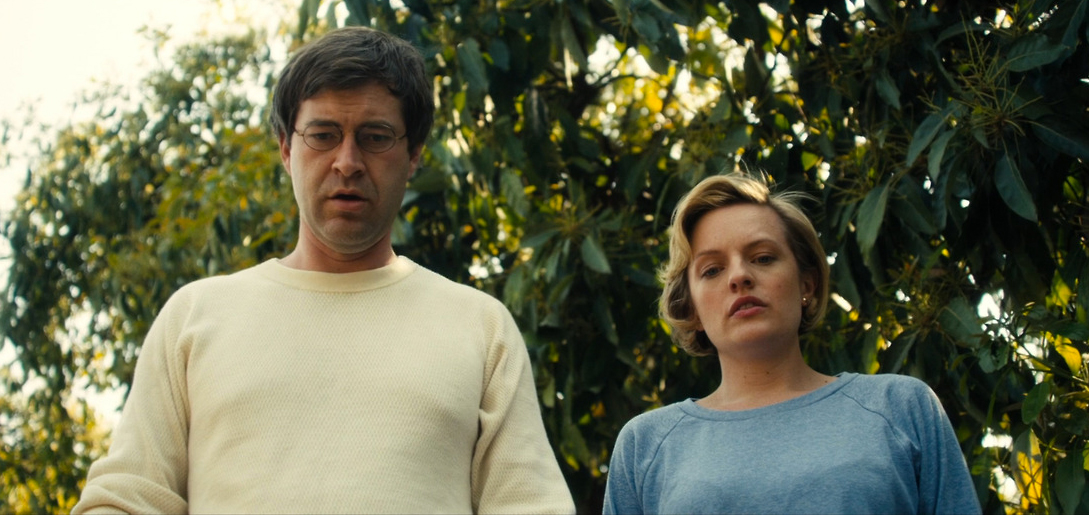
For a film that depends upon a conceptual premise that becomes clear only fifteen minutes into the picture and which is best experienced as a discovery on the part of the viewer, assessing it in vague terms of praise and plot seems to be par for the course in the critical response to The One I Love. Charlie McDowell’s film has somehow managed to make it to VOD in the United States without the marketing of the feature dipping its toes in the water of making direct comparisons to other films that use similar plot devices or by placing the film’s essential moral and emotional quandry front and centre.1 It’s similar, in a sense, to the way in which the marketing team for Ruben Östlund’s amusing and misanthropic Force Majeure restrained themselves from asking of the passer-by the question that haunts the protagonists of that picture – the situational “what if?”2 But platitudes a piece of criticism does not make, and while spoilers will be avoided, credit needs to be given where it is due, which might involve some unusual sentences for those who haven’t seen the film.
The One I Love follows a married couple suffering through a crisis – husband Ethan (Mark Duplass) has cheated on his wife Sophie (Elisabeth Moss) and their therapy sessions, conducted by Ted Danson’s unnamed therapist, don’t seem to be working. They’re only ever hostile to one another and as a result any meaningful communication is shot. Danson makes them hit random keys on a piano, relying upon general probability that they will create a half-decent sound, instead Ethan and Sophie provide a jarring mishmash of sound. As a last ditch effort, the therapist recommends a getaway retreat – isolation and distractionless intimacy the goal for rekindling the spark in their marriage. The retreat itself, though, proves to be more than meets the eye. The film then starts borrowing from a not entirely unusual genre to pair with romance, science fiction, in crafting a exploration of love through Twilight Zone-tinted lenses.3
In fact it’s probably more accurate to describe it as akin to Charlie Brooker’s wonderful television series Black Mirror, which looks at the way in which technology has impacted upon our humanity. An episode in that series, ‘The Entire History of You”, looks at marital distrust by playing upon the idea of precise and rewatchable memories. The One I Love doesn’t play off of technology per se, but it has a similar intention, an assault on trust in relationships through an unusual and high-concept premise. That’s not to say it’s complex, screenwriter Justin Lader manages to keep the explanation for the mystery in a locked box for most of the film’s runtime, and even then only half-heartedly attempts to explain it, and this is in and of itself a virtue. Even in the very structure of the script we’re being pushed to reconsider relationships and emotional truths moreso than loopholes in plot logic.4
It’s a film about lies, half-truths and change, told through a disintegrating relationship. It’s not really about marriage, at least in the same way that Force Majeure or even Gone Girl is ‘about marriage’, rather, it’s about fading love and the desperation inherent in self-deluded reinvention. Because it focuses on one couple, much of the film’s success comes down to the performances of Duplass and Moss, who are the only people on screen for almost the entire runtime. The quality of their performances, much like that of the film itself, creeps up on you, not as a result of bold daring but of subtleties. It’s also impressive that the film chooses not to openly deceive the viewer regarding certain plot elements, instead relying upon some clever dramatic irony to position us as aligned to (or at least in the mindset of) one of the characters at any particular moment.
You could call The One I Love an intimate picture, not only in that it features two actors for almost the entire runtime, with only three characters with any significant on-camera lines, but also in terms of its production. It comes from the Duplass brothers, mumblecore and independent cinema heavyweights (I’m aware of the oxymoronic implications therein) and also features the talents of McDowell’s stepfather in Danson and his mother, Mary Steenburgen, in a voice-only role. Visually it also manages to be both intimate and expansive beyond the confines of the holiday house area. Cinematographer Doug Emmett does a great job in fleshing out the ‘concept’ within the location, giving the film this great and sunny colour palette without feeling the need to dip into heavy handed visual symbolism. Praise also needs to go to editor Jennifer Lilly, who manages to always make the film feel like it’s moving forward, there’s a lively pace to it that’s refreshing.
What The One I Love does isn’t particularly new but it’s in and of itself an inventive picture. Its concept is clever but its structure is even moreso, the delayed satisfaction and the vague canvassing of ideas throughout that serve to stimulate and question rather than reveal make the film feel more than just a self-contained narrative. Performance showcases are also done time and time again, but this one feels both more impressive and more playful than many like it, with Duplass and Moss relishing their roles. Playfulness seeps through in the film, when it goes dark it does so comically and, even in its end, the film carries itself in a winking fashion, having taken the viewer on a loopy journey through love and desire.
Around the Staff
| Felix Hubble |
